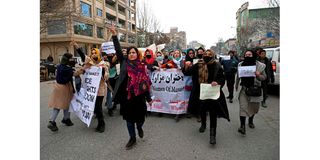Study: Women's rights groups in crisis-hit regions underfunded

Afghan women chant slogans and hold banners during a women's rights protest march in Kabul on January 16, 2022. Grassroots women's rights and women-led organisations operating in crisis-hit areas are acutely underfunded by humanitarian agencies, a situation slowing the progress of gender equality campaigns.
What you need to know:
- The organisations play a critical role in providing effective gender-based violence (GBV) prevention and response services to women and girls impacted by conflict and displacement.
- Aside from existing policies that double-disadvantage smaller organisations, they also face exclusion from decision-making tables across humanitarian forums over funding priorities.
Grassroots women's rights and women-led organisations operating in crises-afflicted areas are acutely underfunded by humanitarian agencies, a situation slowing the progress of gender equality campaigns.
This is despite these groups playing a critical role in providing effective gender-based violence (GBV) prevention and response services to women and girls impacted by conflict and displacement, a new study finding has shown.
The study, Why Wait by the International Rescue Committee, shows that systemic barriers continue to hinder women’s groups from being able to qualify or successfully apply for funding.
“Progress on localisation is too slow, too unambitious, and women’s organisations in particular continue to be marginalised.
“In 2021, for example, the UN Office for the Coordination of Humanitarian Affairs reported that it allocated only 35.8 million of its country-based pooled funds to women’s organisations, which translated into a mere 3.5 per cent of the total sum of $1.01 billion. In contrast, they successfully distributed 27 per cent ($268) to national and sub-national organisations.”
Aside from existing policies that double-disadvantage smaller organisations, they also face exclusion from decision-making tables across humanitarian forums over funding priorities.
“When we (women’s groups) implement donors’ programmes, we feel that we do not have enough authority to actually do what women need in the field, because we are obliged to do only what is written in our partnership.
“The relationship with international organisations is top-down – ’you will do this’. We don’t get funded to ensure our staff safety whereas they spend on their own staffs’ safety. They never ask us how we keep our staff safe from GBV offenders, who we face as part of our work.”
The study recommended the reformation of application criteria that are prohibitive to women’s groups across sectors.
These include the removal of the minimum fund threshold, allowing applications in relevant languages, and making it easier for organisations, which that have not previously worked with the international NGOs, to successfully access funding.
Additionally, it called for the support of women’s organisations across sectors to enable them to develop operational policies required by international humanitarian bodies, through small grants and technical support via humanitarian coordinators and funding advisory boards.
Further, the study pressed for the realisation of localisation commitments within each cluster, inclusive of the GBV sub-sector, by ensuring a minimum of 25 per cent of GBV allocations go to women’s organisations directly.
Lastly, it recommended that funding which is sub-granted to women is passed on with the same level of flexibility and duration as it was received.





